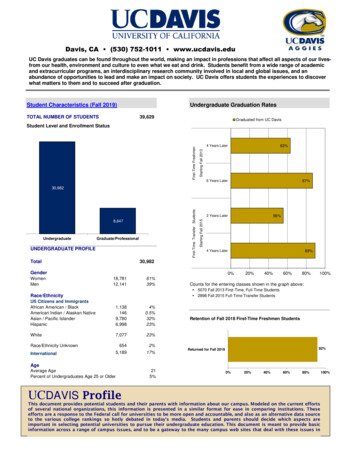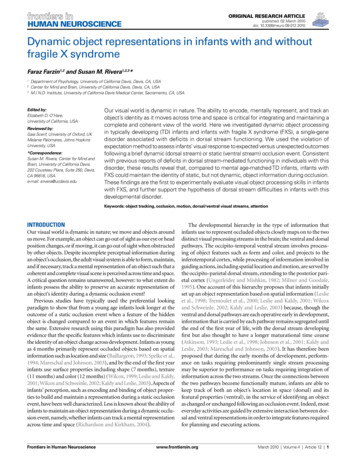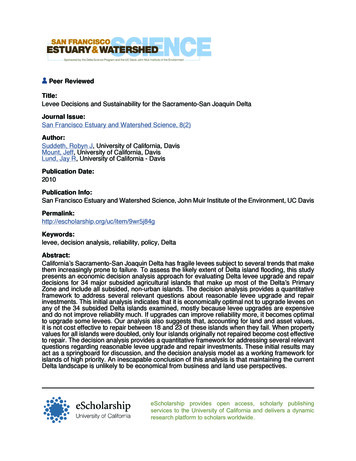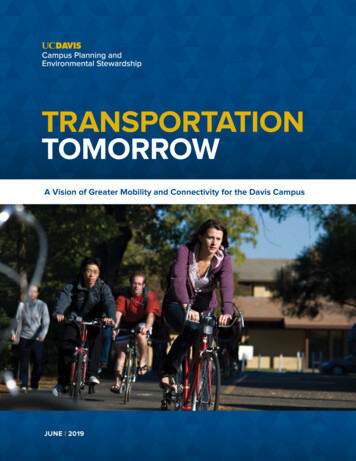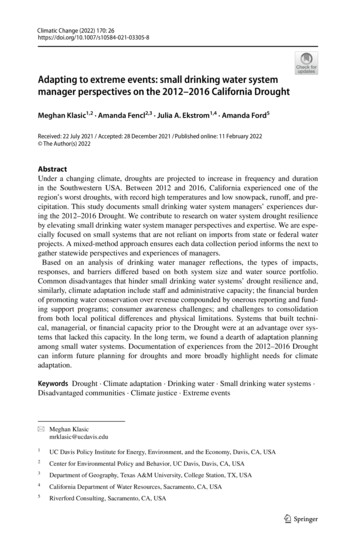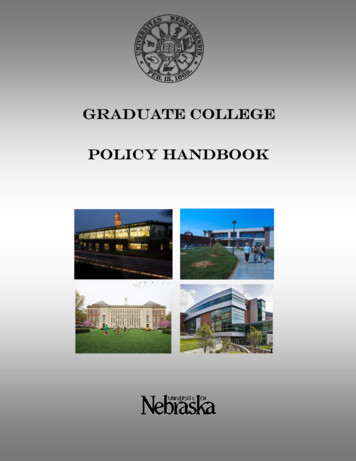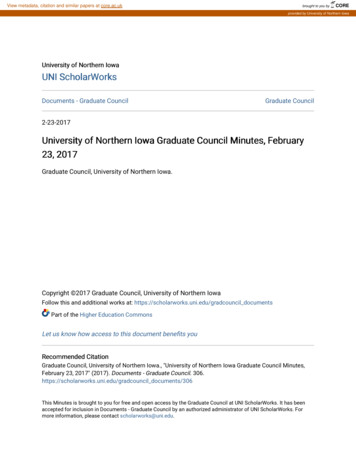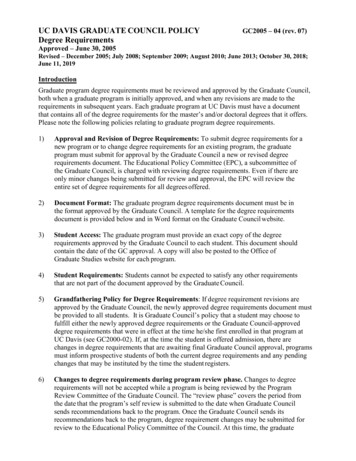
Transcription
UC DAVIS GRADUATE COUNCIL POLICYDegree RequirementsGC2005 – 04 (rev. 07)Approved – June 30, 2005Revised – December 2005; July 2008; September 2009; August 2010; June 2013; October 30, 2018;June 11, 2019IntroductionGraduate program degree requirements must be reviewed and approved by the Graduate Council,both when a graduate program is initially approved, and when any revisions are made to therequirements in subsequent years. Each graduate program at UC Davis must have a documentthat contains all of the degree requirements for the master’s and/or doctoral degrees that it offers.Please note the following policies relating to graduate program degree requirements.1)Approval and Revision of Degree Requirements: To submit degree requirements for anew program or to change degree requirements for an existing program, the graduateprogram must submit for approval by the Graduate Council a new or revised degreerequirements document. The Educational Policy Committee (EPC), a subcommittee ofthe Graduate Council, is charged with reviewing degree requirements. Even if there areonly minor changes being submitted for review and approval, the EPC will review theentire set of degree requirements for all degrees offered.2)Document Format: The graduate program degree requirements document must be inthe format approved by the Graduate Council. A template for the degree requirementsdocument is provided below and in Word format on the Graduate Council website.3)Student Access: The graduate program must provide an exact copy of the degreerequirements approved by the Graduate Council to each student. This document shouldcontain the date of the GC approval. A copy will also be posted to the Office ofGraduate Studies website for each program.4)Student Requirements: Students cannot be expected to satisfy any other requirementsthat are not part of the document approved by the Graduate Council.5)Grandfathering Policy for Degree Requirements: If degree requirement revisions areapproved by the Graduate Council, the newly approved degree requirements document mustbe provided to all students. It is Graduate Council’s policy that a student may choose tofulfill either the newly approved degree requirements or the Graduate Council-approveddegree requirements that were in effect at the time he/she first enrolled in that program atUC Davis (see GC2000-02). If, at the time the student is offered admission, there arechanges in degree requirements that are awaiting final Graduate Council approval, programsmust inform prospective students of both the current degree requirements and any pendingchanges that may be instituted by the time the student registers.6)Changes to degree requirements during program review phase. Changes to degreerequirements will not be accepted while a program is being reviewed by the ProgramReview Committee of the Graduate Council. The “review phase” covers the period fromthe date that the program’s self review is submitted to the date when Graduate Councilsends recommendations back to the program. Once the Graduate Council sends itsrecommendations back to the program, degree requirement changes may be submitted forreview to the Educational Policy Committee of the Council. At this time, the graduate
GC2005 – 04 (rev. 7)program and the EPC will work together to expedite the review, revision, and approvalprocess. See “Policy Regulating Programmatic Changes Submitted for Review by GraduateCouncil” oad/users/programmatic changes policy.pdf.7)Response to review of degree requirement changes. If a graduate program submitsrevisions to its degree requirements and the Educational Policy Committee (or theGraduate Council) requests revisions to the degree requirements document but receives noresponse back from the program within six months, the Educational Policy Committee willalert the Graduate Council's Program Review Committee (PRC). The PRC may decide toexpedite its review of the graduate program. Additionally, Graduate Council may takefurther action.8)Updating URLs: URL’s in approved degree requirements may be updated by the Office ofGraduate Studies without requiring additional review by Graduate Council.Contact InformationFor questions and information regarding submission of requests for degree requirement changes,please contact:Graduate Council AnalystAcademic Senate Office402 Mrak Hall(530) 752-0623Process InformationRequests for degree requirement changes are submitted to the Graduate Council Chair c/o theGraduate Council Analyst in the Academic Senate Office, who will forward requests for reviewto Council’s Educational Policy Committee. Either the EPC Chair, another member of thecommittee or the committee analyst will contact the program chair and staff directly regardingany additional needed clarifications, corrections or edits. Once the EPC has approved therevised document, it will be presented to Graduate Council for final review and approval. IfCouncil requests additional edits, it may approve the degree requirements contingent on therequested edits being made. If the changes are more substantial, Council may wish to reviewthe document again. In that case, the Council Analyst will inform the graduate program chair ofCouncil’s decision and ask the program to accept the edits and submit an electronic version ofthe final document to the analyst. When the revised document is received, Graduate Council’sformal letter of approval will be sent to the program along with a copy of the final degreerequirements reflecting Graduate Council’s approval date. An electronic copy of the documentwill be sent to the program for its records and kept in Graduate Studies’ program files. Thedocument will also be posted to the Office of Graduate Studies website.Documents to be Submitted for Review by Graduate Council1)Page 2A cover memo (pdf or Microsoft Word document) from the graduate program chairmust accompany the request for degree requirement changes; this memo must be fromthe chair of the program and not any other program member or delegate. The memoshould include:
GC2005 – 04 (rev. 7)a) The date and manner in which the program approved the proposed degree requirementchanges, e.g., in a graduate program meeting or by an e-mail ballot, including the vote.b) A summary of the revisions and rationale for proposing the individual changes.c) If the proposed changes are in response to recommendations in the program’s recent PRCreport, include the recommendation that initiated the change and provide a brief statementregarding how the recommendation is implemented in the revised degree requirements.2)An electronically submitted stand-alone Microsoft Word document of the DegreeRequirements document, formatted as detailed below. If the degree requirements are in aseparate section of the program’s graduate student handbook, only this section should besubmitted for review and approval. If the degree requirements are embedded in thegraduate student handbook, they should be moved into a separate removable section.Please do not submit the entire graduate student handbook when requesting degreerequirement changes. Submitted degree requirements must use the .docx format.Graduate Council’s preference is to receive two page-numbered documents*:(1.) The currently approved degree requirements document in Word, with theproposed changes “tracked” using the MS Word track changes tool:(2.) An “accept changes”/clean copy version in Word of the proposed newdegree requirement document.*Should the program not be able to provide 1) above due to a major revision to conform tothe new format requirements, then the Chair’s cover memo will be considered a sufficientreplacement, providing the changes are outlined clearly, and in-depth.Page 3
GC2005 – 04 (rev. 7)GRADUATE GROUP OR PROGRAM & NAMEPh.D. AND/OR MS/MA/MFA/MAS DEGREEREQUIREMENTSRevised: List previous year(s) and current revisiondate Graduate Council Approval:General Instructions: Every section listed in this Template must be included in your degreerequirements document. For instance, even if you have no “Special Requirements,” youshould include that section heading and state “None.” The review process will go much moresmoothly if you check your document side by side with this template, and ensure that yourdocument follows it. Also, avoid language such as “should”, “normally,” “typically,”wherever possible. That is, try to be as definitive and unambiguous as possible. Use gendernon-specific pronouns (e.g. they, them). Include URLs or hyperlinks, as appropriate. Allinstructions embedded in this template are italicized and highlighted in yellow. URLs areprovided throughout with additional information, so you should rarely have to go outside ofthis document for guidance and regulations. However, any questions should be directed to theGraduate Council Analyst in the Academic Senate Office.Programs are encouraged to reach out to the Graduate Studies policy analyst for support withdegree requirements before conducting their required faculty vote. The Graduate Studiespolicy analyst can review the degree requirements for use of the latest preferred language,identify inconsistencies across sections, advise about potential issues uncovered by StudentAffairs Officers (SAOs), and offer hands-on help with formatting issues. The policy analyst islisted on the Graduate Studies webpage, or your SAO can refer you.Master’s Degree Requirements1) Admissions requirements:State all of the requirements for admission to the Program, specifying the prerequisites andprocedures to make up deficiencies. Also state minimum GPA (3.0 is the university minimum),minimum test scores, and requirements for placement exams, if applicable. The GRE is not acampus requirement and need not be required by your program; many programs are choosingto remove the GRE as a requirement. Please note that applicants must submit a completedOffice of Graduate Studies online application, and any supplemental material the Programrequires. If current admissions requirements include the GRE, Graduate Studies is not able towaive the GRE for any applicant until Graduate Council has approved revised degreerequirements prior to the September opening of the respective admissions cycle.For example:Consideration for program admission requires a bachelor’s degree, three letters ofrecommendation, official transcripts, GRE General Test scores (if applicable),TOEFL or IELTS score (if applicable) and an Office of Graduate Studies onlineapplication with fee by the stated admission deadline. A minimum GPA of 3.0 isrequired. [If the GRE is required.] Most successful applicants have a GRE VerbalReasoning score at or above the 60th percentile, a GRE Quantitative Reasoning scoreat or above the 80th percentile and an Analytical Writing score at or above the 50thpercentile. Most successful applicants also have a TOEFL score of 100 or higher,above the university minimum of 80. However, admissions decisions are made on acase-by case basis based on a holistic review of each candidates application. MeetingPage 1
GC2005 – 04 (rev. 7)some or all of these criteria does not guarantee admission, but merely eligibility. Thedecision to recommend admission to the Dean of Graduate Studies will be made bythe Program Admissions Committee on the basis of available space and thecompetitiveness of applicants compared to the eligible pool.Avoid referring students to URLs or other sources outside of this document foradmissions (or other) requirements. Reason: The aim is to make this document asmuch of a one-stop shop as possible. The rule of thumb is as follows: if theprogram/group generally determines the requirements (subject to divisionregulations etc.), students should not be referred to outside sources; but if theprogram/group has no control over the requirement, for instance PELP rules,referral to campus/university sources is appropriate.Note: An applicant may not be required to formally secure a major sponsoringprofessor prior to admission. However, wording can be used that works towards thatgoal. For example:Applicants are strongly encouraged to communicate with potential research advisors(major professors) prior to admission to the program. It is essential that prospectivestudents contact faculty in the (e.g.) Chemistry Department and/or the ChemistryGraduate Group (give URL) whose laboratories are conducting research in areas ofChemistry that the student wishes to pursue, in order to introduce themselves andinquire about faculty willingness to accept a new student in this degree program. Thisprocess of communicating with potential major professors should begin in the Fall,prior to the relevant applications deadline. Applicants should take the initiative toinquire about future research directions of laboratories, exchange research ideas withpotential major professors, and make every effort to identify viable possibilities.While formal acceptance into a research group cannot occur prior to admission,contacts should be sufficiently developed such that at least tentative identification ofa research advisor can be made as soon after the time of admission as possible.a) Prerequisites: If specific topics of coursework are required as a prerequisite,please list them using the following format:In addition to the admission requirements stated above, applicants are expected tohave passed the equivalent of the following UC Davis courses:CHE 129A/BOrganic Chemistry 3 units/ 2 unit labSTA100Applied Statistics4 unitsb) Deficiencies: Please indicate when coursework deficiencies should be completed, notethat they cannot be taken S/U unless the courses are approved as exceptions bygraduate council df), and indicate if certain grades are requiredin these courses. Typically, deficiencies should be completed in the first year.For example:Course work deficiencies (e.g. missing prerequisites) should be made up by the end ofthe first academic year following initial enrollment by earning a letter grade of “B” orbetter.Page 2
2) M.A., M.S., M.A.S., LL.M, etc. and Plan I, II or bothGC2005 – 04 (rev. 7)Specify the master’s degree (M.A., M.S., M.A.S., LL.M., ) and Master’s Plan, e.g.Plan I (Thesis) or Plan II (Comprehensive Examination). Plans I and II, as well as theplans for other degree types, are described under Sections 500-508 in the DavisDivision Academic Senate Regulations on the Web at the lations/regulations#500Plan I: List your requirements for Plan I using the format below, adapted for yourparticular program requirements. This should provide a succinct description of the totalunits, graduate course units, research units, and other key requirements.Plan I. This plan requires a minimum of (e.g.) 46 units of graduate and upper divisioncourses (the 100 and 200 series only), of which at least (e.g.) 16 must be graduatework in the major field. In addition, a thesis or research project in lieu of a thesis isrequired. The research thesis/project serves as the capstone requirement.If your UNIT requirements exceed the UC Davis minimum for Plan I, add the following:This Plan requires more units than the UC Davis minimum, which are: 30 units ofgraduate and upper division courses (the 100 and 200 series only), at least 12 of whichmust be graduate work in the major field.Plan II: List your requirements for Plan II using the format below, adapted for yourparticular program requirements.Plan II. This plan requires a minimum of (e.g.) 56 units of graduate and upper divisioncourses, of which at least (e.g.) 24 units must be graduate courses in the major field.Not more than (e.g.) 16 units of research (299 or equivalent) may be used to satisfy the(e.g.) 24-unit requirement. A comprehensive final examination (i.e. capstone) in themajor subject is required of each candidate. No thesis is required. The capstonerequirement is fulfilled by State in brief how the capstone requirement will be fulfilled, with further detailsprovided below. Options can be found upload/files/grad-council/gc201202 capstone requirements.pdf.If your UNIT requirements exceed the UC Davis minimum for Plan II, add the following:This Plan requires more units than the UC Davis minimum, which are:36 units of graduate and upper division courses, of which at least 18 units must begraduate courses in the major field. Not more than 9 units of research (299 orequivalent) may be used to satisfy the 18-unit requirement.Please note that there are Davis Division Regulations pertaining to the various degreesthe campus is approved to offer; please read the regulations to be sure your programis following all the pertinent regulations for your specific degree lations/regulations#500-). Forexample:M.Ed. and M.Engr. degree candidates must satisfy the requirements for Plan II exceptPage 3
GC2005 – 04 (rev. 7)that only 12 of the 36 units need be in graduate level (200 series) courses.M.F.A. degree candidates must satisfy the requirements for Plan I except that 48 unitsare required, and candidates shall submit a suitable project in lieu of a thesis.M.A.T degree candidates must satisfy the requirements for Plan II, and mustcomplete a minimum of 18 units in professional courses in Education3) Course Requirements - Core and Electives (total # units)Please note the different requirements for Plan I and Plan II (see above); you mayrequire more than the minimum and you may offer both plans. When you discuss yourcourse requirements, you must include a summary table or figure. Two samples areattached.Provide the following information:a) Core Courses (total required # core units)Indicate course number, course name, and number of unitsSTA100Applied Statistics4 unitsb) Elective Courses (total required # elective units)The list of electives can be either general or specific. For example, you couldindicate that students may take any course in your College or a particulardepartment as an elective. Or you could include a list of specific courses. Iflisting specific courses, indicate course number, course name, and number ofunits. Give some thought to how often the elective courses are typicallyoffered when developing your list.STA100Applied Statistics4 unitsc) Research (total required # research units):If 299 (or similar) units are required, state how many. Note differencesbetween Plans.d) English Language RequirementAll programs should include mention of the Grad Council requirement forEnglish Language proficiencyStudents who have not obtained a previous degree at an approved Englishmedium institution or demonstrated English-language proficiency through anappropriate exam (e.g. TOEFL) are required to complete appropriate Englishlanguage courses, as described in the policy Graduate Student CourseRequirements – English as Second Language (GC2018-02). Courses taken insatisfaction of this requirement do not count towards the units required forgraduation.e) Summary:Indicate how many total units (core, elective or research) are required, howmany must be graduate coursework and how many can be upper divisioncourses. Also note that a minimum course load is 12 units each academicquarter, and that per UC regulations students should not ordinarily enroll inmore than 12 units of graduate level courses (200) or more than 16 units ofcombined undergraduate and graduate level (100, 200, 300) courses perquarter. Please note that electives are chosen with the approval of thegraduate advisor, if applicable to your program (see Section 6b: CourseGuidance or Advising Committee).Page 4
GC2005 – 04 (rev. 7)For example:14 units of core coursework, 10 units of lab rotations, 3 units of electives and4 units of participatory seminars are required for a total of 31 units. Full-timestudents must enroll for 12 units per quarter including research, academic andseminar units. Courses that fulfill any of the program course requirementsmay not be taken S/U unless the course is normally graded S/U. Once courseunit requirements are completed, students can take additional classes asneeded while completing their Thesis (Plan I) or Capstone (Plan II), althoughthe 12 units per quarter are generally fulfilled with a research class (299) andperhaps seminars. Per UC regulations students should not ordinarily enroll inmore than 12 units of graduate level courses (200) or more than 16 units ofcombined undergraduate and graduate level (100, 200, 300) courses perquarter.4) Special RequirementsSpecify any special requirements such as a foreign language requirement,examination requirement, seminar presentation requirement, teachingrequirements, etc.5) Advising Structure and MentoringSpecify the role of the Graduate Advisor, master advisor, major professor,staff, etc. State where the program’s Mentoring Guidelines can be found.Always and consistently use the following nomenclature.For example: The Major Professor is the faculty member who supervises thestudent’s research and thesis; this person serves as the Chair of the ThesisCommittee. The (faculty) Graduate Advisor, who is appointed by GraduateStudies to have signatory authority, is a resource for information on academicrequirements, policies and procedures, and registration information until theCourse Guidance Committee is formed. The Graduate Program Coordinator(staff) assists students with identifying a major professor, identifyingappointments, and general university policies. The Mentoring Guidelines canbe found in the graduate student handbook (describe how it can be obtained; onthe web—provide a web address that will not likely change over the next fewyears).6) CommitteesList all that are relevant to graduate education in your program: AdmissionsCommittee, Course Guidance or Advising Committee, Thesis Committee,Comprehensive Exam Committee, etc. Please be sure these committeedescriptions are consistent with your bylaws.a) Graduate Program CommitteeIndicate whether your program has a graduate program committee, who makes upthis committee (# faculty and # students), and their general role in graduateeducation in your program.b) Admission Committee: Describe the admission procedure.For example: Once the completed application, all supporting material, andthe application fee have been received, the application will be reviewed byPage 5
GC2005 – 04 (rev. 7)the Admissions Committee. The Admissions Committee consists of (number)graduate group faculty and (number) students. Based on a holistic review ofthe entire application, a recommendation is made to accept or decline anapplicant’s request for admission. That recommendation is forwarded to theDean of Graduate Studies for final approval of admission.Notification of admissions decisions will be sent by Graduate Studies.Applications are (accepted throughout the year / accepted in Fall Quarter ofthe previous year / accepted through Spring Quarter for the next Fall enteringclass / etc).c) Course Guidance or Advising Committee if there is one. If not, mentionhow a student goes about developing their study plan under the “AdvisingStructure and Mentoring” section. Most often there is a course guidancecommittee. However, in some cases, the Graduate Advisor and/or the majorprofessor assist the student in developing the study plan. Specify whetherthere are any requirements regarding when such a "Plan of Study" should ormust be submitted to the graduate program. Note whether differencesbetween Plans (e.g. Plan I or Plan II) exist. Indicate how a student ismatched with a major professor, including the roles of the student, faculty,and program. If a student is given primary responsibility for finding a majorprofessor, indicate how the program will help in cases where a match doesnot naturally occur. Indicate a timeline for formation of theGuidance/Advising Committee, e.g. by the end of the 1st quarter.d) Thesis Committee or Comprehensive Examination Committee and itsmakeup. State how nominations to the committee membership are obtained.Note that Thesis Committee nominations are submitted to the Office ofGraduate Studies for formal appointment in accordance with GraduateCouncil policy; Comprehensive Exam (“Capstone”) Committees areappointed by the program (not Graduate Studies). Indicate whether or notthe major professor is a member of the committee and indicate how the Chairof the committee is chosen. A minimum of three members is required forThesis Committees and a minimum of two is required for CapstoneCommittees, although a minimum of three is suggested. Per CCGA guidance,for Capstone Committees at least one of the members should have no vestedinterest in the outcome, i.e. the student should not be their GSR orcollaborator.For example: Thesis Committee: The student, in consultation with theirmajor professor and graduate advisor, nominate (number) faculty to serve onthe Thesis Committee. These nominations are submitted to the Office ofGraduate Studies for formal appointment in accordance with GraduateCouncil policy. The major professor serves as Chair of the committee.7) Advancement to CandidacyState the quarter when the student is expected to advance to candidacy, alongwith the following information:Every student must file an official application for Candidacy for the Degree ofMaster of “ ” and pay the Candidacy Fee after completing one-half of theircourse requirements and at least one quarter before completing all degreerequirements; this is typically the [x quarter]. The Candidacy for the Degree ofPage 6
GC2005 – 04 (rev. 7)Master form can be found online at: http://www.gradstudies.ucdavis.edu/forms/.A completed form includes a list of courses the student will take to completedegree requirements. If changes must be made to the student’s course plan afterthey have advanced to candidacy, the Graduate Advisor must recommend thesechanges to Graduate Studies. Students must have their Graduate Advisor andcommittee Chair sign the candidacy form before it can be submitted to GraduateStudies. If the candidacy is approved, the Office of Graduate Studies will send acopy to: the appropriate Graduate Program Coordinator and the student; theThesis Committee Chair will also receive a copy, if applicable. If the Office ofGraduate Studies determines that student is not eligible for advancement, theprogram and the student will be told the reasons for the application’s deferral.Some reasons for deferring an application include: grade point average below3.0, outstanding “I” grades in required courses, or insufficient units.8) Comprehensive Examination and/or Thesis Requirements:a) Thesis Requirements (Plan I): If you have any program-specificrequirements, such as length or format of any written or oral requirement,specify these in this section. Please specify a typical timeline to helpstudents understand the process of completing a thesis; for example, statewhen they form their committee, how often the committee meets with thestudent, and the possible outcomes once the thesis is submitted. Also includethat thesis committee members have a responsibility to review the thesiswithin four weeks (one month) after being provided a copy. Please alsostate that should the committee determine that the thesis is unacceptable, arecommendation to disqualify the student will be made to the Dean ofGraduate Studies.For example:Thesis committee meetings: The candidate and major professor should meetat least once a year with the other members of the thesis committee todiscuss progress and any changes in research objectives. It is expected thatthe candidate and major professor meet more regularly.Thesis: Research for the Master's thesis is to be carried out under thesupervision of a faculty member of the program and must represent anoriginal contribution to knowledge in the field. The thesis research must beconducted while the student is enrolled in the program. The thesis issubmitted to the thesis committee at least one month before the student plansto make requested revisions; committee members must provide feedbackwithin four weeks of receipt of the thesis, per the Policy on Service onAdvanced Degree Committees (GC1998-01). This does not include summermonths, for committee members having nine month appointments. Oncereturned, the student will make necessary revisions and return the thesis tothe committee for approval or additional revisions. Students should provide atimeline, developed in consultation with their Major Professor, to thecommittee at least one quarter before the student expects to graduate. Themajor professor or Graduate Advisor should intervene in cases where facultyare not meeting the required timeline. All committee members must approvethe thesis and sign the title page before the thesis is submitted to GraduateStudies for final approval. Should the student fall short of makingsatisfactory progress on the thesis at any point in time, the Major Professor orthe Graduate Advisor should submit an annual assessment, or one or morePage 7
GC2005 – 04 (rev. 7)interim assessments, to Graduate Studies that describes the marginal orunsatisfactory assessment of the student’s progress. Should the committeedetermine at any point that the student’s progress is unacceptable forcontinuation in the program, even with substantial revisions to the work, theprogram may recommend to the Dean of Graduate Studies that the student bedisqualified from the program.The thesis must be filed in a quarter in which the student is registered or onfiling fee. Instructions on preparation of the thesis and a schedule of datesfor filing the thesis in final form are available from Graduate Studies; thedates are also printed in the UC Davis General Catalog and in the ClassSchedule and Registration Guide issued each quarter. A student must havea GPA of 3.0 for the M.S. degree to be a
Approved - June 30, 2005 . Revised - December 2005; July 2008; September 2009; August 2010; June 2013; October 30, 2018; June 11, 2019. Introduction . Graduate program degree requirements must be reviewed and approved by the Graduate Council, both when a graduate program is initially approved, and when any revisions are made to the
